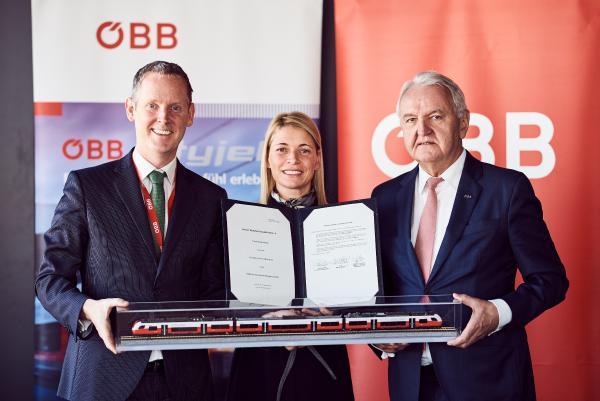
- ÖBB-PV purchases new Cityjet trains
- ÖBB-PV deal single largest EFSI transaction in Europe
- First EUR 100 million tranche signed
The European Investment Bank (EIB) is providing ÖBB-Personenverkehr AG (ÖBB-PV) with a EUR 500 million loan to purchase new rolling stock. A first EUR 100 million tranche has already been signed with ÖBB-PV. This loan from the EU bank will be secured by a guarantee from the European Fund for Strategic Investments (EFSI). EFSI is the central plank of the Investment Plan for Europe (IPE), in which the EIB and the European Commission are strategic partners, which is designed to strengthen the competitiveness of Europe’s economy. ÖBB-PV AG will use the loan to purchase new Cityjet train sets for local and regional services.
EIB Vice-President Andrew McDowell, who is responsible for the EU bank’s activities in Austria, said in Vienna: “Our deal with ÖBB-PV is the single largest transaction under EFSI in Europe so far. For us, the EU bank, supporting sustainable and innovative transport solutions is one of our top financing priorities. The European Union means to bring practical, tangible improvement to its citizen’s quality of life; we at the EU Bank are at the forefront of using economic means to make these improvements a reality.” He went on to say that “High quality efficient services and modern reliable trains are all important to persuading travellers to switch to rail. We are therefore particularly pleased to have ÖBB-PV as a substantial new partner in realising these objectives.”
“We are delighted by the excellent cooperation with the European Investment Bank. This loan will finance the acquisition of our new Cityjet train sets – an investment that stands for sustainable state-of-the-art rail transport in Austria and represents an important pledge to our customers, which we also want to attract to rail in the future”, said ÖBB-PV board member Evelyn Palla.
European Commissioner for Transport Violeta Bulc said: "This project not only supports investment and job creation in Europe, it also enables the transition to low emission mobility. These new trains will contribute to the attractiveness of the rail sector in Austria. All in all, this is good news for Austrian commuters and for the environment."


